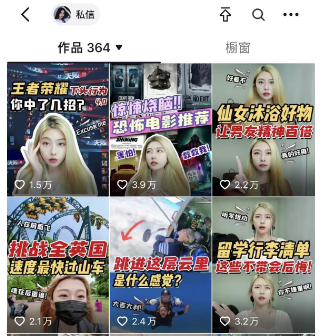On the inaugural day of China's monumental online shopping spectacle in 2022, a charismatic influencer showcased an array of items that ranged from skincare products to electronics before millions of viewers. By the end of the day, he had orchestrated a sales spectacle of epic proportions, raking in an astounding 11 billion yuan ($1.5 billion) in revenue.
Although the impressive sales record belongs almost exclusively to Li Jiaqi, an industry legend, he became the source of inspiration for many young Chinese and his job became a preferred career path. In a July survey of more than 10,000 young people on Weibo, over 60 percent expressed an interest in pursuing careers as internet influencers or livestreaming hosts.
This is a profession with almost no entry barriers, Lu Jiazui, an influencer with over 1.2 million fans on short-video platform Douyin, told CGTN. "What you need to do to stand out is to find a beacon within in you. It can be anything you are good at. Bargaining, shopping, and so on."

A screenshot of Lu Jiazui's Douyin account. /CGTN
A screenshot of Lu Jiazui's Douyin account. /CGTN
China's short-video and livestreaming sales events have emerged as an indispensable part of daily life and have experienced remarkable growth over the past few years, reshaping how people consume content and make purchasing decisions. In the wake of the COVID-19 pandemic, when people across the country were required to spend more time at home, social media apps such as Douyin and Kuaishou have become a primary source of entertainment, information, and commerce.
Content creators on these platforms have harnessed their creativity to engage audiences, resulting in viral sensations and booming online communities. The user base of these platforms has exceeded one billion as of 2023, with netizens spending a daily average of three hours consuming videos filmed and edited on smartphones, actively contributing to the market of nearly 300 billion yuan ($41 billion), according to an industry report by MobTech.
The potential for fame and fortune has propelled the Chinese youth to chase their dreams in this rising industry. It is a platform where they can quickly amass sizable followings, which can then be translated into substantial income through advertising, brand collaborations, and cash-convertible virtual gifts from viewers. For many young people, this offers the tantalizing prospect of financial independence and celebrity status.

A screenshot of one of Lu Jiazui's videos on Douyin. /CGTN
A screenshot of one of Lu Jiazui's videos on Douyin. /CGTN
But that's not all. For Lu, who recently graduated from a UK master's program in marketing, the primary reason for her becoming an influencer was that she didn't think she was capable of doing the conventional nine-to-five office routine.
"I have a strong desire to share my views, which extend to some of the products I'm promoting, and there may be people who happen to like what I say. I think this is something that makes everybody happy," said Lu, who in her videos shares romance stories and gives relationship advise to young women.
For influencers like Lu, the industry taps into the desire for authenticity and personal expression, which strongly resonates with young individuals.
Feng Yong, a singer with a decent following on Douyin, said her sense of self-expression and the ability to connect with like-minded individuals fulfills a sense of belonging and purpose, which also helps increase her exposure and promote her songs. Her first Douyin video was simply the recording of a humorous conversation between her and her father, which went viral and motivated her to make more.

A screenshot of one of Feng Yong's Douyin videos. /CGTN
A screenshot of one of Feng Yong's Douyin videos. /CGTN
Most of Feng's videos now mainly feature her sharing her life and singing her own published songs, "which might appeal to those who hadn't listened to my songs but like me for who I am," the young college graduate told CGTN.
For anyone considering committing to short-video creation as either a full-time occupation or a part-time endeavor, the opportunities for revenue generation are abundant, but profit margins are notably lower when contrasted with live sales.
Lu, who has made Douyin videos for two and a half years, has a team of her own where she's responsible for the creative and performing part of the job while others take care of post-production and business-related outreach.
"I make more than most people around my age, but not insanely more," Lu said, adding that she is also exploring her opportunities in the livestreaming space.
In China, following years of unbridled e-commerce expansion and increasingly sophisticated logistical support, many businesses have leveraged the potential for direct-to-consumer marketing and sales through livestreaming events, fueling a lucrative ecosystem where influencers, celebrities, and everyday users alike could monetize their online presence. As of 2020, the livestreaming industry employed 1.23 million hosts, according to iResearch, and a surge in livestream sales during the COVID-19 pandemic propelled the industry to achieve a staggering 3.5 trillion yuan in revenue in China.
Yang Nannan, a college graduate with a major in broadcasting and presiding, joined the profitable profession as soon as she was released into the job market in her senior year. "It pays well as far as internships go," she told CGTN.

A screenshot of Yang Nannan hosting a livestreaming sales event. /CGTN
A screenshot of Yang Nannan hosting a livestreaming sales event. /CGTN
Comparing her current occupation with her previous job as a speech coach, she said working as a livestreaming sales host is less demanding, more flexible and informs her more about a sector that increasingly permeates people's lives.
In recent years, just as China's tech and tutoring industries were shrinking due to structural changes in the economy, the short-video and livestreaming sector began to show potential for supplementing the job losses due to the diverse range of roles, such as video editing, marketing, and platform management.
The dynamic nature, rapid growth, and constant innovation in the industry has rendered it hungry for talents and graduates with higher degrees. As projected by Iresearch, the amount of talent in the field will surge from 1.81 million in 2021 to 5.74 million in 2023, which is a growth rate of 217.1 percent.
For Lu and Yang, who both have a degree higher than many, the industry is where they are committed to staying, even after they quit appearing in front of the camera.
"As a sales host it is too competitive to stay ahead," said Yang. She might switch from her current position to being a producer in the future, as this is where she could employ what she learned in college.
The industry will continue to grow, with studies suggesting that certain portions of the Chinese population who have been slow to join this new consumer base will eventually find their way to embracing it. Livestreaming sales are projected to generate over four trillion yuan in 2025, making up a quarter of all e-commerce revenue.
Still, the industry's prosperous outlook doesn't mean everyone entering it will be better off. While a monthly base salary of 10,000 yuan collected by Yang is considered decent at her age, especially if she earns more in sales bonuses, it's difficult to know how long she can maintain a steady stream of income, and whether she becomes a star will depend not just on her performance but also on how fierce her competition is.
So while the goal of getting rich and famous may be unrealistic for most, the short-video and livestreaming sector is nonetheless filling a gap in China's diversifying workforce.